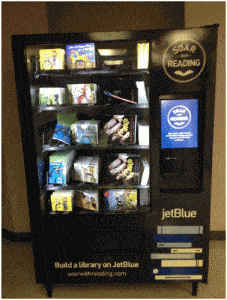 Yet another study has shown that increasing access to books improves student outcomes
Yet another study has shown that increasing access to books improves student outcomes
“Reaching Families Where They Are: Examining an Innovative Book Distribution Program,” published in Urban Education, examines a community-wide effort to promote greater access to books through the mechanisms of physical and psychological proximity. It addresses the seasonal summer slide through an innovative book distribution program in neighborhoods identified as “book deserts.” Four low-income neighborhoods were provided with vending machines used to dispense free children’s books over the summer months. Within a design research framework, the study was designed to capture how, why, and in what ways these machines were used in communities. Results indicated that providing greater access through close physical proximity to books and greater adult support enhanced children’s opportunities to learn.
As part of its Soar with Reading program, airline JetBlue commissioned a study by Susan Neuman, childhood literacy expert and one of the researchers of a 2001 study that illustrated there is access to only one age-appropriate book for every 300 children in underserved communities. Neuman was tasked with finding out if the landscape was better or worse for our nation’s children
JetBlue created an advisory board made up of childhood literacy and development experts which helped develop a plan that was piloted in one of the communities in need: Anacostia, Washington, DC., where there is access to only one age-appropriate book for every 830 children, and
This past summer, JetBlue designed vending machines that dispensed brand-new, free books for kids ages 0-14. Three vending machines were placed in family-friendly locations in the community. Kids were allowed to take as many books as they were interested in – no strings attached.
The report concluded by recognizing that providing access to resources by reaching families where they are and encouraging adult support may be a key enabler toward enhancing parent engagement and children’s early literacy development.








 Yet another study has shown that increasing access to books improves student outcomes
Yet another study has shown that increasing access to books improves student outcomes